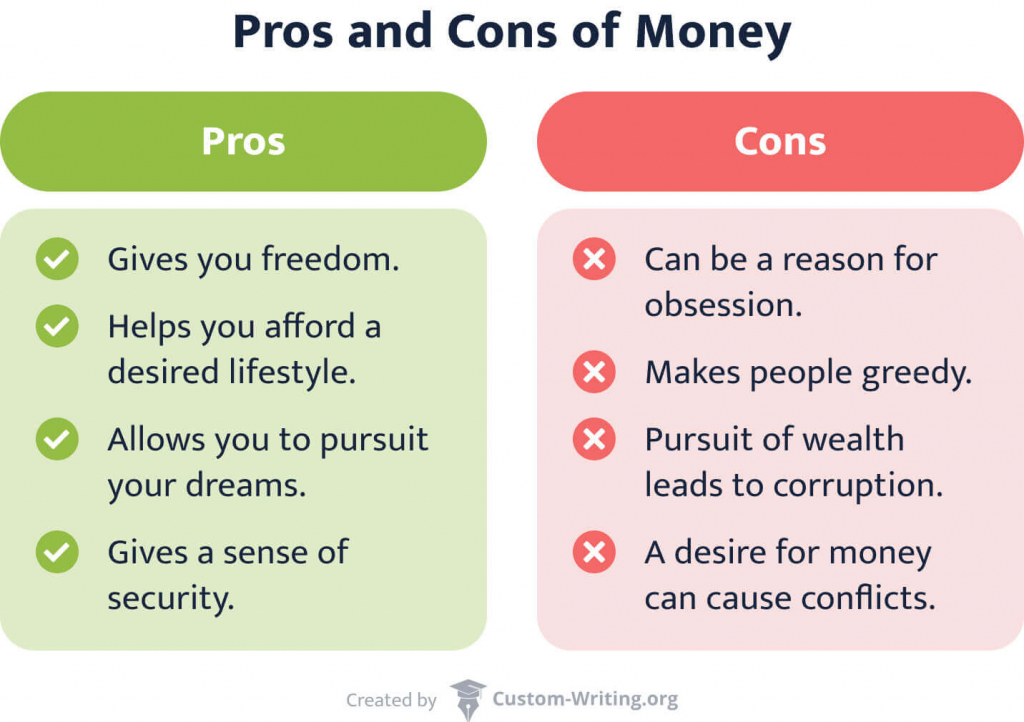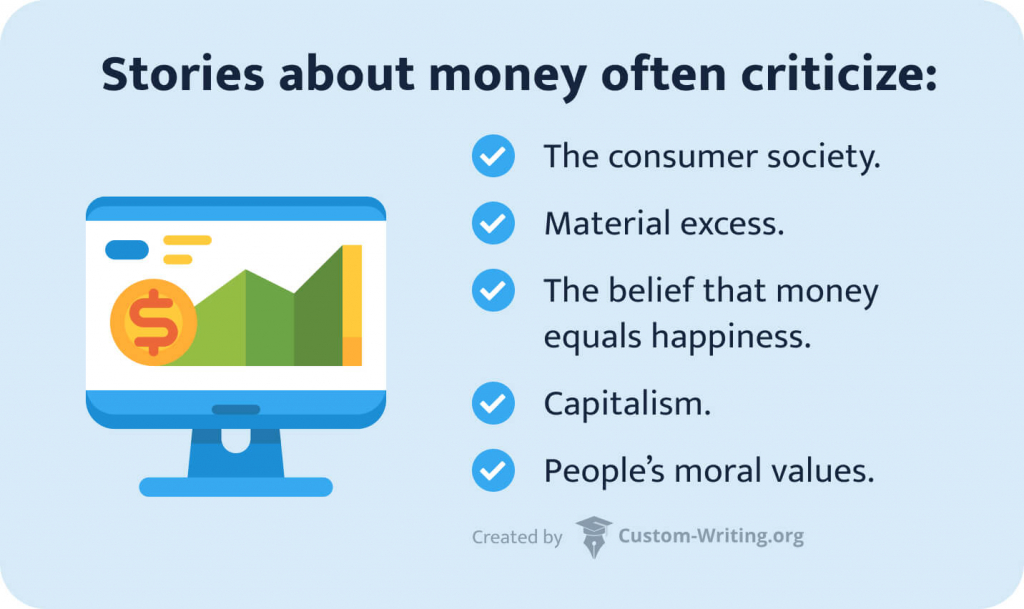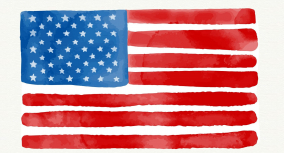Themes about money are very prominent in American and world literature. Countless writers have explored whether money is the root of all evil, often coming to contradictory conclusions.
In literary works, themes of money and greed frequently coexist alongside corruption. Yet, despite the negative connotations, money remains profoundly connected to emotional well-being. In his 2024 article, Forbes contributor John Jennings argued that people who have more money are generally happier than those who have less, citing a number of studies that prove wealth isn’t inherently a bad thing.
This ambivalence plays a big role in the popularity of money-related themes in literature. For example, F.S. Fitzgerald explored wealth’s power to destroy lives, while Jane Austen demonstrated how riches can coexist with genuine love.
In this article, our custom-writing team will:
- Explore money and wealth themes and their features
- Show how it’s reflected in various literary works, including The Great Gatsby and “The Necklace”
- Present quotations that highlight themes about wealth
💰 Money Theme in Literature: What Is It?
Can money bring happiness, or does it only bring destruction? Everyone would answer this question differently. In our everyday life, we use money as a universal medium of exchange. The pros and cons of money stem from its purpose as well as people’s attitude towards it.

Writers often use the theme of money to explore human nature, as people tend to show their true colors when it comes to acquiring it or sharing their wealth.
In literature, the negative aspects of money are discussed more often than the positive ones. The concept “money can’t buy happiness,” for instance, is prevalent in many literary works. Most stories serve as cautionary tales that warn people of the consequences of greed and corruption.
Money vs Wealth: What’s the Difference?
Money and wealth are two concepts that often get confused. Nevertheless, they are different.
- Money is something intangible. It can only be measured in numbers.
- Wealth is an abundance of money or valuable possessions. It includes assets such as real estate, investments, and cash.
In other words, someone can be wealthy without owning any money. Both money and wealth are connected with one’s social class, as they grant a certain type of power.
How Money Affects Morality
Throughout time and history, money has been a symbol of social power. Though its form has constantly been changing, the function stayed the same. The duality of money and its effect on people is the topic of many debates.
On the one hand, money is seen as something that helps people to progress and develop. On the other hand, it’s also true that the pursuit of money affects people’s thoughts and judgments in the following negative ways:
- It clouds one’s moral judgment. The sense of power that comes with money can often make people less perceptive of others’ needs.
- It reduces empathy. Studies (such as the one presented in the article How Money Changes the Way You Think and Feel) have shown that individuals with higher income are less perceptive of other people’s emotions. Lack of social vulnerability and experience doesn’t allow them to relate to others fully.
- It leads to dissatisfaction. Sometimes even if a person has money, they might never feel like it’s enough. When someone always strives for more, it leads them to continuous dissatisfaction and affects their mental health.
- It may become an addiction. The pursuit of wealth can turn into an obsession. That addiction comes from the pleasant feeling a person gets after they receive or spend money.
There is a saying that goes, “money is the root of all evil.” Though the statement might be true to a certain extent, usually it is not the money but our attitude towards it that causes serious problems. Money shouldn’t be used as a symbol of power but instead should be used wisely so that everyone can lead a fulfilling life.
🤑 Money Theme: Related Concepts with Examples
A lot of works that explore the theme of money serve as social criticism. They criticize phenomena such as greed, materialism, power, love, and the American dream.

The discussion about money brings up many interesting questions, and it lets authors ponder different ideas.
Themes about Money and Greed
Greed is an overly strong desire to possess something. If a person is greedy for money, they care too much about their possessions and want to own more even if they already have enough. Greed is considered a negative quality, and it can be expressed in different ways.
When someone’s greed turns into addiction, it hurts the person and the ones around them. For instance, someone’s greed can deprive others of their essential needs. John Steinbeck’s The Pearl is an excellent example of a novella that reflects on the idea of greed. It is a story of a man who becomes corrupt due to his sudden experience of wealth, and he turns on his loved ones.
Materialism Theme
Materialism is an attitude that gives particular importance to material goods. It’s usually associated with being manipulative, competitive, and lacking empathy. Such behavior isn’t appreciated by most people but is encouraged by the capitalistic systems.
Often, people tend to develop materialistic values when such pursuit is presented as important and having benefits. Happy and successful people portrayed in the media are usually wealthy. It encourages others to view such a lifestyle as desirable.
The Necklace by Guy de Maupassant touches upon the theme of materialism. The story shows how putting too much importance on material things can ruin people’s lives.
Money and Power Theme
Throughout history, money has served as a symbol of power and success. If a person has money, they don’t have to struggle to achieve their goals. However, this kind of attitude towards wealth and money is what causes the most problems. When people strive for money to get power, they get overtaken by greed and become corrupt.
The Great Gatsby by F. Scott Fitzgerald is an example of a novel that explores the themes of money and power. The book shows how these two notions affect people’s actions and cloud their judgment.
Money and Corruption Theme
Corruption is illegal or dishonest behavior and abuse of entrusted power. This notion is tightly linked with money, as it often involves bribing and misuse of public funds. Corruption derives from greed and the desire for more power. It erodes trust, hurts the economy, and weakens democracy.
In William Shakespeare’s Macbeth, corruption is discussed throughout the play. It causes Macbeth to perform heinous acts and leads to his downfall.
Money and the American Dream
The concept of the American dream gives money particular importance. Initially, the American dream symbolized freedom and social equality in the New World. With time, however, it evolved into something else.
By the 1920s, the American dream was promoting wealth and a materialistic lifestyle. For that reason, many US citizens started chasing money to fulfill their American dream. This chase is reflected in the play A Raisin in the Sun by Lorraine Hansberry. The story shows how materialistic the American dream has become. The author draws our attention back to the original values.
Love vs Money Theme
Love vs. money is a topic of constant debate. The two are connected closer than you may think. It’s often discussed in literary works how the notion of love is confused with desire for material possessions. People often rely on their money to make themselves appealing to others.
The Merchant of Venice is a play by William Shakespeare that portrays the world in which even love has a price. The author notes how affluence conceals greed and superficiality. It also depicts how love is turned into something materialistic. If you want to read it, the full text of The Merchant of Venice is available on Project Gutenberg website.
💸 Themes about Money in Classic Novels
Money has always been integral in the formation of social norms and moral values. So, it is not surprising that the theme of money and wealth is present in many classical works of literature. The most prominent authors of all times, from Wilde to Tolstoy, have examined the disastrous impact of wealth on human relationships and morality.
Here are some of the best examples of how wealth is discussed in literature:
- Pride and Prejudice examines the impact of money on social class division and wealth-based marriage restrictions in the society of Regency-era England.
- Great Expectations offers an insightful analysis of how wealth improves social mobility prospects and ultimately affects people’s identity.
- Anna Karenina dwells on the class-dependent social expectations in Imperial Russia and its failure to ensure personal happiness.
- The Picture of Dorian Gray is a brilliant account of the corrupting impact of wealth and status on a person’s morality.
A closer analysis of these novels sheds light not only on the individual relationships with money but also on the broader social dynamics shaped by wealth. These themes are relevant to their historical periods as well as present-day societies.
🍸 Theme of Money in The Great Gatsby
One of the central topics in Fitzgerald’s novel The Great Gatsby is money. The book talks about many aspects related to it:
- How money is used to win someone’s favor. The author shows how Jay Gatsby tries his best to become rich, prove his worth to people, and win their hearts.
- How money is seen as an equivalent of happiness. In the novel, the idea that people often confuse having money and happiness is reflected very well through the characters of Gatsby and Daisy. Both of them believe that having money will make their lives better.
- Materialism and corruption. Fitzgerald’s book reflects how Americans strive for nothing but money and success, forgetting about their humanity.
- The American Dream. The Great Gatsby talks about the hollowness and corruption of the American Dream, which now focuses solely on wealth.
- The power that comes with money. The story clearly shows how money makes people more powerful and important in the eyes of others.
- Old money vs. new money. In his novel, Fitzgerald notes that the most important thing is not how much money one has but how one gets it. Characters in the book consider Tom and Daisy superior to Gatsby, as they are highly educated, respectable, and their families were rich for centuries. Gatsby, on the contrary, has to constantly worry about his shallow business because he came from nothing.
If you wish to learn more about the novel, feel free to read our article on themes in The Great Gatsby.
The Great Gatsby Quotes about Wealth
Here are some interesting quotations that illustrate how the idea of wealth is represented in Fitzgerald’s novel:
In my younger and more vulnerable years my father gave me some advice that I’ve been turning over in my mind ever since. “Whenever you feel like criticizing any one,” he told me, “just remember that all the people in this world haven’t had the advantages that you’ve had.”
The Great Gatsby, Nick Carraway, Chapter 1
I couldn’t forgive him or like him, but I saw that what he had done was, to him, entirely justified. It was all very careless and confused. They were careless people, Tom and Daisy— they smashed up things and creatures and then retreated back into their money or their vast carelessness, or whatever it was that kept them together and let other people clean up the mess they had made.
The Great Gatsby, Nick Carraway, Chapter 9
When I came back from the East last autumn I felt that I wanted the world to be in uniform and at a sort of moral attention forever; I wanted no more riotous excursions with privileged glimpses into the human heart. Only Gatsby, the man who gives his name to this book, was exempt from my reaction—Gatsby, who represented everything for which I have an unaffected scorn.
The Great Gatsby, Nick Carraway, Chapter 1
💎 Money and Wealth Theme in Literature: The Necklace
The Necklace is a story that highlights how appearance and reality are two different things. It shows that materialistic values bring no happiness to people and only destroy their lives.
Greed is the reason for the downfall of the main character, Mathilde. Her desire to belong to a higher class society and wear expensive clothes is so strong that it makes her unable to distinguish between reality and appearance. Maupassant criticizes a materialistic society that gives importance to material possessions.
When Mathilde finally gets what she desires the most, her joy is fleeting. The woman finds happiness in objects she doesn’t even possess. In the end, her obsession with wealth and the chase after it makes her life miserable.
Greed for money is one of the main themes in Maupassant’s short story; you can learn more from our article on the themes in The Necklace.
The Necklace: Quotes about Money
Here are some interesting quotations that illustrate how the theme of money is portrayed in Maupassant’s short story:
Her hair badly dressed, her skirts awry, her hands red, she spoke in a loud tone, and washed the floors in large pails of water. But sometimes, when her husband was at the office, she would seat herself before the window and think of that evening party of former times, of that ball where she was so beautiful and so flattered.
The Necklace, Narrator
She thought of the exquisite food served on marvelous dishes, of the whispered gallantries, listened to with the smile of the sphinx while eating the rose-colored flesh of the trout or a chicken’s wing.
The Necklace, Narrator
There is nothing more humiliating than to have a shabby air in the midst of rich women.
The Necklace, Mathilde Loisel
☀️ Money Themes in A Raisin in the Sun
A Raisin in The Sun by Lorraine Hansberry focuses on money as a source of conflict. It also touches upon the topics of materialism and the American dream.
All members of the Younger family view money differently:
- Mama sees it as a way to fulfill her dream of owning a house. Her desire can symbolize the yearning for freedom from racial prejudice.
- Beneatha dreams of entering medical school, which also shows her desire to overcome racism and sexism.
- Walter is driven by the desire to have a higher social class. The man is frustrated by his inability to provide for his family. In the end, Walter changes his heart and reclaims his pride by rejecting a bribe.
A Raisin in the Sun reflects the destructive nature of the American dream and its materialistic values. The main characters all try to pursue their dreams. The strong desire for success at all costs almost ruins their family. The play attempts to show that family values and human nature stand above materialism and greed for money.
A Raisin in the Sun: Quotes about Money
Here are quotations that reflect the pursuit of money in Hansberry’s play:
Walter: I want so many things that they are driving me kind of crazy… Mama—look at me.
A Raisin in the Sun, Walter Lee Younger, Act 1, Scene 2
Mama: Oh—So now it’s life. Money is life. Once upon a time freedom used to be life—now it’s money. I guess the world really do change…
A Raisin in the Sun, Lena Younger (Mama) and Walter Lee Younger, Act 1, Scene 2
Walter: No—it was always money, Mama. We just didn’t know about it.
Mama: No… something has changed. You something new, boy. In my time we was worried about not being lynched…You ain’t satisfied or proud of nothing we done. I mean that you had a home; that we kept you out of trouble till you was grown; that you don’t have to ride to work on the back of nobody’s streetcar—You my children—but how different we done become.
Walter: [W]e have decided to move into our house because my father—my father—he earned it for us brick by brick. We don’t want to make no trouble for nobody or fight no causes, and we will try to be good neighbors. And that’s all we got to say about that. We don’t want your money.
A Raisin in the Sun, Walter Lee Younger, Act 3
🪞 Theme of Wealth in The Picture of Dorian Gray
Oscar Wilde’s novel offers a sharp and insightful critique of Victorian English society’s superficiality of social judgment. The author vividly describes false, corrupt values that disguise people’s true nature and make them obsessed with glamorous status symbols.
Though most of the plot is dedicated to Dorian Gray’s miraculous escape from aging, youth and beauty in this novel may also be perceived as a symbol of preserving financial wealth at all costs. While the rich maintain a bright and untarnished image in public, their darker, sinful nature is covered up by social support and approval. This way, Wilde demonstrates how the veil of wealth protects the rich from law, moral prosecution, and other forms of punishment for their wrongdoings.
For most characters, financial success is synonymous with moral superiority, meaning that, in their eyes, the rich are always right. In a society where wealth is the only valued virtue, and the only approved lifestyle is that of hedonism and self-indulgence, there is no place for moral integrity and objective moral judgment.
Quotes about Money from The Picture of Dorian Gray
“Young people, nowadays, imagine that money is everything.”
The Picture of Dorian Gray, Lord Fermor and Lord Henry, Сhapter 3
“Yes,” murmured Lord Henry, settling his button-hole in his coat; “and when they grow older they know it.
“What does money matter? Love is more than money.”
The Picture of Dorian Gray, Sibyl Vane, Chapter 5
💡 Themes about Wealth in Great Expectations
Great Expectations is another thoughtful classical work that reflects on the superficial promises of wealth. By examining the protagonist’s life changes and evolving identity after acquiring an inheritance from a mysterious relative, Charles Dickens dwells on the corrupt nature of the illusion that “money can buy everything.”
The story’s central character, Pip, dreams of high society and wealth by associating his personal happiness, welfare, and Estella’s favors with money. However, as soon as he receives an enormous sum and realizes all his expectations, he enters a world starkly different from what he imagined. Instead of dropping that new lifestyle, Pip adjusts his morals and values to it, thus losing his genuine self for the sake of pleasure.
Another valuable lesson of Great Expectations is the story of Miss Havisham, a rich woman financing her own fantasy life and driven into reclusive madness with unlimited wealth. Instead of enjoying life to the fullest, the novel’s characters are driven to the confines of money, suffering from emotional paralysis, and unable to recognize their captivity.
Great Expectations Quotes about Money
We spent as much money as we could, and got as little for it as people could make up their minds to give us.
Great Expectations, Pip, Chapter 34
Dissatisfied with my fortune, of course I could not be; but it is possible that I may have been, without quite knowing it, dissatisfied with myself.
Great Expectations, Pip, Chapter 18
🚆 Wealth Themes in Anna Karenina
Anna Karenina is a unique narrative centered around ethics, morality, and wealth in the high society of Imperial Russia. Tolstoy’s characters face serious challenges influenced by outside factors of their society as well as their personal choices.
The author pays special attention to wealth’s adverse effect on human relationships. Many characters of the novel make choices and establish social relationships based on their perceptions of a social and financial match instead of relying on their true feelings and values. Those who are financially well-off and expected to enjoy life to the fullest exist in an atmosphere of mistrust and disenchantment instead.
Tolstoy’s vivid portrayal of the pursuit of wealth and its degrading impact on human virtues remains exceptionally relevant today. The novel highlights the universal theme of using wealth as a misguiding moral compass and the life-changing choices between financial well-being and moral integrity.
Quotes about Money from Anna Karenina
“Duties are bound up with rights — power, money, honor; those are what women are seeking.”
Anna Karenina, Pestsov, Part 4, Chapter 10
“Like the profits made by banks” he went on. “This is evil, I mean, the acquisition of enormous fortunes without work, as it used to be with the spirit monopolists. Only the form has changed.”
Anna Karenina, Konstantin Levin, Part 6, Chapter 11
💕 Theme of Money in Pride and Prejudice
Pride and Prejudice is a brilliant literary work dealing with the centuries-old theme of financial considerations in marriage. The novel’s events are set in Regency-era England, a period when wealth was a determinant of social standing, recognition, family stability, and access to all kinds of social resources. This is why young women from families on financial decline were urged to marry wealthy men (“marry into wealth”) to save their family’s prestige and restore its status.
The novel also exposes the senseless social rules of male inheritance of family estate, which is portrayed through the Bennets. While the family has money and property, the absence of a male heir leaves the daughters of Mr. and Mrs. Bennet without a chance to access those financial benefits, thus seeking financial security in marriage.
In her novel, Jane Austen focuses on the tension between practical financial interests and emotions. It’s normal for a human being to strive for emotionally rewarding relationships, which often leads to the conflict between romantic feelings and pragmatism. The bond between Elizabeth and Mr. Darcy illustrates how financial stability and emotional connection can coexist. In contrast, the case of Charlotte and Mr. Collins is less fortunate: she accepts his proposal solely for pragmatic reasons, thus exposing the limited agency that women used to have in that historical period. To learn more, check out our study guide on Pride and Prejudice.
Money Theme in Pride and Prejudice: Quotes
The world is blinded by his fortune and consequence, or frightened by his high and imposing manners, and sees him only as he chooses to be seen.
Pride and Prejudice, George Wickham, Chapter 16
They may wish many things besides his happiness; they may wish his increase of wealth and consequence; they may wish him to marry a girl who has all the importance of money, great connections, and pride.
Pride and Prejudice, Elizabeth Bennet, Chapter 24
Thanks for reading our article! We hope that you found it helpful and learned something new. If you enjoyed the article, don’t hesitate to share it with your friends.
❓ Money Theme in Literature FAQ
How Is the Theme of Love Related to Money in The Great Gatsby?
Fitzgerald’s The Great Gatsby shows how love and the desire to possess someone or something can be confused. Many relationships in the novel are affected by wealth. For example, in Daisy and Tom’s relationship, money is the only connection.
What Poems Have a Theme about Money?
Numerous poems are dedicated to the topic of money. Some notable examples are:
- Velocity by Allan Ginsberg,
- Fool’s Money Bags by Amy Lowell,
- Money by Philip Larkin,
- Money by Robert Frost.
What Is the Theme of Money in Araby Story?
Araby by James Joyce shows how a desire for success pushes every Dubliner to become more materialistic. Their ambition is frustrated by a lack of opportunity, the strength of their own vices, or a combination thereof.
What Techniques Does Fitzgerald Use to Introduce the Theme of Wealth?
Here’s how Fitzgerald introduces the topic of wealth in The Great Gatsby:
- He uses the contrast between people of different social classes;
- He creates a mystery about certain characters to give them importance;
- He uses geographical locations and symbolism to represent various aspects of American society.
🔍 References
- Does Money Buy Happiness? Actually, Yes: Forbes
- Why Money Is Important: LendEDU
- The Grip of Greed: Psychology Today
- What Psychology Says About Materialism and the Holidays: American Psychological Association
- The Complicated Ways that Money Messes with Your Morals: BBC
- The Power of Money: Cadmus Journal
- The Merchant of Venice: For Love or Money: Pedestal Magazine
- East V. West (Money): Union College
- Money and Literature: Brill
- 7 Money Lessons Learned from Literature: The Street







